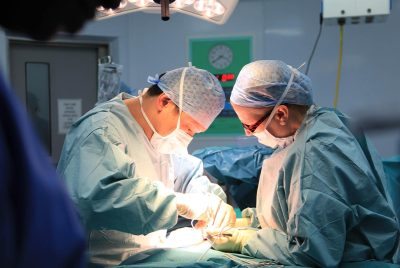
Comprehensive Guide to Gastric Sleeve Surgery
Gastric sleeve surgery, or the sleeve gastrectomy, is a life-changing weight loss surgery designed for individuals living with obesity / excess weight. It significantly reduces stomach size. This bariatric surgery helps individuals lose weight by limiting food intake and altering hunger hormones. Removing a large portion of the stomach creates a narrow, sleeve-like structure, aiding substantial weight reduction.
 Ideal for those with a body mass index (BMI) of 35 and above who have been unable to lose weight using traditional methods, gastric sleeve surgery facilitates rapid weight loss and offers many health benefits. Many patients see remission of obesity-related conditions like type 2 diabetes, high blood pressure, and sleep apnoea, enhancing their quality of life.
Ideal for those with a body mass index (BMI) of 35 and above who have been unable to lose weight using traditional methods, gastric sleeve surgery facilitates rapid weight loss and offers many health benefits. Many patients see remission of obesity-related conditions like type 2 diabetes, high blood pressure, and sleep apnoea, enhancing their quality of life.
However, as with any major surgery, there are risks like bleeding, infection, and nutritional deficiencies. Successful outcomes require a thorough preoperative assessment and an individualised, holistic aftercare programme that supports the patient in making suitable lifestyle changes, including a healthy diet, and increased physical activity.
Understanding the procedure and its potential benefits and risks is crucial for those considering this weight-loss surgery. The sleeve gastrectomy can be transformative, providing a path to a healthier lifestyle and overcoming severe obesity.
Key Takeaways
 Gastric sleeve surgery is an effective method for achieving substantial weight loss by reducing stomach size, to that of a thin tube, and influencing hunger hormones, with many patients losing approximately 65% of their excess weight within the first year.
Gastric sleeve surgery is an effective method for achieving substantial weight loss by reducing stomach size, to that of a thin tube, and influencing hunger hormones, with many patients losing approximately 65% of their excess weight within the first year.
This surgical procedure not only aids in weight loss but also offers health benefits, such as the potential remission of obesity-related conditions like type 2 diabetes and high blood pressure, enhancing overall quality of life and allowing for increased physical activity.
It is crucial for patients to understand the potential risks involved, including short-term complications, and the importance of a thorough preoperative assessment and lifestyle changes to ensure successful outcomes.
Understanding Gastric Sleeve Surgery
 The sleeve gastrectomy is a type of bariatric / weight loss surgery designed to help individuals living with severe obesity to achieve a significant reduction in weight. This endoscopic procedure (keyhole surgery) involves reducing the size of the stomach, restricting food intake and allowing individuals to lose weight more effectively.
The sleeve gastrectomy is a type of bariatric / weight loss surgery designed to help individuals living with severe obesity to achieve a significant reduction in weight. This endoscopic procedure (keyhole surgery) involves reducing the size of the stomach, restricting food intake and allowing individuals to lose weight more effectively.
Removing a large portion of the stomach not only reduces food intake, it also affects hunger hormones, decreasing appetite and improving satiety. This assists in supporting individuals in making healthier food choices, supporting them in following a health diet.
What is Gastric Sleeve Surgery?
The gastric sleeve surgery, is a weight loss surgery that significantly reduces the size of the stomach to promote weight loss. During the procedure, a large part of the stomach is removed, leaving a narrow, sleeve-like structure that resembles the shape of a banana. The smaller stomach restricts the amount of food one can eat, in one sitting, supporting the patient in reducing the volume of food they are able to eat.
Patients typically experience substantial weight loss, with many losing around 65% of their excess weight within the first year. This keyhole surgery is popular due to its effectiveness and relatively straightforward nature compared to other bariatric surgeries, such as the gastric bypass surgery.
How Does Gastric Sleeve Surgery Work?
The sleeve gastrectomy works by mechanically restricting the stomach’s capacity and altering hormonal signals related to hunger and satiety. The surgeon divides and removes a large portion of the stomach, creating a sleeve-shaped section. This new, smaller stomach restricts food intake, helping patients to feel fuller sooner and thus consume fewer calories.
Furthermore, removing part of the stomach changes hormone production, like ghrelin (hunger hormone), reducing appetite. These physical and hormonal changes make gastric sleeve surgery a powerful tool for losing weight and achieving sustained weight loss.

Benefits of Gastric Sleeve Surgery
The Gastric sleeve offers numerous advantages that go well beyond just weight loss. This procedure helps patients shed excess pounds and significantly improves their overall health. Weight loss from the sleeve gastrectomy can lead to remission of obesity-related conditions like type 2 diabetes, hypertension, and sleep apnoea.
Many patients also enjoy an improved quality of life and increased physical activity due to less strain on their bodies. The popularity of this procedure continues to grow, with more than half of all bariatric surgeries in the US being the sleeve gastrectomy.
Weight Loss Outcomes
Following the sleeve gastrectomy patients often lose 60% to 70% of their excess weight within the first year. This not only helps in achieving a healthier body weight but also reduces the risk of developing severe obesity-related health illnesses, such as non-alcoholic fatty liver disease and certain cancers.
Increased physical activity as patients lose weight further boosts their weight loss, energy and health. This significant and sustained weight loss is one of the primary reasons why the sleeve gastrectomy is a preferred choice for many seeking a solution to severe obesity.
Types of Weight Loss Surgery
Weight loss surgery, also known as bariatric surgery, encompasses a variety of procedures designed to help individuals living with obesity lose weight and improve their health and quality of life. The most common types are gastric sleeve surgery, gastric bypass, and adjustable gastric banding. Each procedure works differently but shares the common goal of reducing food intake and altering digestion to promote significant weight loss and resolving or reducing obesity related illnesses.
 Health Improvements
Health Improvements
Losing weight through gastric sleeve surgery offers numerous health improvements beyond weight loss. A significant benefit is the potential remission of type 2 diabetes, with some patients stopping diabetic medication soon after surgery.
The surgery can also lead to a significant reduction in the risk of developing heart disease, certain cancers, and other obesity-related health conditions. Adopting a healthier lifestyle post-sleeve gastrectomy surgery, with a balanced diet and regular physical activity, enhances overall well-being and longevity.
Risks and Complications of Gastric Sleeve Surgery
While the sleeve gastrectomy offers many benefits, including losing weight, it is essential to be aware of the potential risks and complications. Like any major surgery, it carries general risks such as bleeding, infection, and adverse reactions to anaesthesia. Specific to sleeve gastrectomy, complications can include leaks from the staple line and nutritional deficiencies due to the reduced stomach size.
Patients must stay informed, attend regular checkups and closely monitor their health, contacting their medical team if any side effects occur.
Short-term Risks
In the short term, patients may experience immediate complications such as lung issues, blood clots, and leaks from the surgical site. These risks are particularly significant in the days and weeks following the procedure, making close postoperative monitoring essential. Immediate medical attention can mitigate these risks and ensure a smoother recovery process.
Knowing these short-term risks helps set realistic expectations for recovery.
Eligibility Criteria for Gastric Sleeve Surgery
Determining eligibility for gastric sleeve surgery is a critical step in the process. This weight loss surgery is typically recommended for individuals with a Body Mass Index (BMI) of 35 or higher or those with a BMI of 30 and above who have obesity-related health conditions.
These criteria ensure the surgery benefits patients in terms of losing weight and overall health.
BMI Requirements
Gastric sleeve surgery candidates generally need to have a BMI of over 35 or a BMI of 30 and above, accompanied by obesity-related health illnesses. Obesity related conditions include; sleep apnoea, fatty liver disease, heart disease, type 2 diabetes etc.
Other Health Criteria
Other health criteria, in addition to BMI, are considered to determine eligibility for the sleeve gastrectomy. A complete health assessment is required, including general health, age, and psychological readiness. This comprehensive assessment often involves a team of healthcare professionals, including your consultant and specialist nurse, who work together to ensure you are prepared for the journey ahead.
Preparing for Gastric Sleeve Surgery
Proper preparation is vital for the success of gastric sleeve surgery. This involves thorough preoperative evaluations and following a pre-operative diet. Patients undergo tests / investigations and a surgeon and specialist nurse consultation to ensure they are ready for surgery.
The preoperative diet, usually followed 2 to 4 weeks prior to surgery, reduces the size of the liver, facilitating a safer surgery and aiding in losing weight before the procedure. It also assists with adapting to the eating habits that are required in the immediate post-operative period.
Preoperative Evaluations
Before undergoing gastric sleeve surgery, patients must complete several preoperative evaluations. These include medical history reviews, measurement of height, weight and vital signs (blood pressure, pulse etc), and various medical tests including blood tests and electrocardiograms (ECG). Additional tests like lung function tests may also be required to ensure the patient is in optimal health for the surgery.
These evaluations identify potential risks and prepare the patient and the surgical team for successful, safe surgery.
 Lifestyle Changes
Lifestyle Changes
Losing weight is multi-factorial, adopting healthy lifestyle changes is one essential factor for patients preparing for gastric sleeve surgery. This involves committing to healthy eating habits, eating a nourishing, nutritious, healthy diet, stress management and increasing physical activity for long-term success. Patients are also encouraged to engage in regular check ups and adhere to the personalised care plans provided by their healthcare team.
Mr. Alan Li emphasises a holistic approach to patient care, integrating nutritional support and lifestyle changes alongside surgical intervention to ensure the best outcomes for his patients.
The Gastric Sleeve Procedure
The sleeve gastrectomy involves removing a large portion of the stomach to create a smaller, sleeve-shaped stomach, which aids in losing weight by limiting food intake. This keyhole surgery typically uses minimally invasive laparoscopic methods involving small incisions for quicker recovery.
The procedure is done under general anaesthesia and usually takes 60 to 90 minutes.
Surgical Techniques
During gastric sleeve surgery, the surgeon uses laparoscopic techniques to make small incisions in the abdomen. A laparoscopic stapler is then used to divide and remove most of the left part of the stomach, creating a thin tube sleeve-like structure. The endoscopic procedure allows for quicker recovery, reduced postoperative pain, and aids in losing weight more effectively compared to open surgery.
However, if laparoscopic methods are deemed unsafe, the procedure may need to be completed with an open incision.
Duration and Recovery Time
Gastric sleeve surgery typically takes 60 to 90 minutes, making it relatively quick compared to other weight loss surgeries. General anaesthesia ensures patients are unconscious and pain-free during the operation.
Post-surgery, patients can expect a recovery period of about 1 to 3 weeks before returning to work and 4 to 6 weeks for full activities. This swift recovery time and significant weight loss within the first six months is one of the many reasons gastric sleeve surgery is a popular choice among bariatric procedures.
 Postoperative Care and Recovery
Postoperative Care and Recovery
Effective postoperative care and recovery are crucial for the success of the sleeve gastrectomy, especially in the context of losing weight. Patients typically stay in the hospital for one to two days after the surgery, during which the healthcare team closely monitors their condition.
Following discharge, patients must adhere to a specific diet progression to allow the stomach to heal and attend regular follow-up appointments to ensure their recovery is on track and to address any concerns that may arise.
Hospital Stay
The typical hospital stay after gastric sleeve surgery is 1 to 2 days. During this time, patients are monitored for immediate complications such as bleeding, infection, or leaks from the surgical site. The healthcare team ensures the patient is stable and provides guidance on postoperative care before discharge.
The initial hospital stay is critical for early detection and management of potential issues.
 Diet Progression
Diet Progression
Diet progression post-surgery is a structured process that helps the stomach heal and adjust to its new size. Initially, patients follow a liquid diet for two weeks. This is followed by transitioning to pureed foods for 2 weeks, soft foods for 2 weeks, and then onto solid foods from 6 weeks onwards.
This gradual progression avoids complications and ensures proper healing.
Patients should aim for small portions, eat slowly and chew their food well during this period and beyond to aid digestion and adaptation, which is crucial to promote healthy digestion and to facilitate weight loss.
 Follow-up Appointments
Follow-up Appointments
Follow-up appointments are critical to recovery and also success after gastric sleeve surgery. Regular check ups allow healthcare providers to monitor the patient’s weight loss progress, adjust nutritional plans, and address postoperative concerns. Regular follow-ups prevent nutritional deficiencies and ensure the patient adapts well to their new lifestyle.
Typically, patients should expect follow-up appointments at 6 weeks post up and then at 3 monthly intervals during the first year, 6 monthly during the second year post-surgery and then annually to maintain long-term success. Appointment timings do vary in accordance to the individual needs of the patient.
Comparing Gastric Sleeves to Other Bariatric Surgery Procedures
When considering weight loss surgery, it is essential to compare the sleeve gastrectomy to other bariatric options, especially in weight loss. Gastric sleeve surgery and gastric bypass are two of the most commonly performed bariatric procedures, each with specific benefits and risks.
Understanding these differences helps patients choose the surgery that best suits their needs.
Gastric Bypass vs. Gastric Sleeve procedure
Gastric bypass surgery involves creating a small stomach pouch and rerouting the intestines, which can lead to more significant initial weight loss compared to the sleeve gastrectomy but also involves a more complex recovery process. Gastric sleeve surgery, on the other hand, is less complex as it does not involve bypassing any part of the stomach, making it a less invasive option.
Both procedures have their unique risks; for instance, gastric bypass patients may experience dumping syndrome, while gastric sleeve patients may experience acid reflux. Gastric sleeve surgery has a good track record for long-term weight loss and health improvements.
Other Bariatric Options
Other bariatric options, such as adjustable gastric banding and the duodenal switch, are available in addition to gastric sleeve and bypass surgeries. Adjustable gastric banding involves placing a band around the stomach to restrict food intake, which can be adjusted as needed.
The duodenal switch combines sleeve gastrectomy with a bypass to limit food absorption, offering a more aggressive weight loss solution. Each option has different criteria and outcomes, so patients should discuss with their healthcare providers to determine the most suitable procedure for losing weight.
Cost
The cost of the sleeve gastrectomy can vary significantly based on several factors, including the location and the surgeon’s expertise. In the UK, the price for this weight loss surgery typically ranges from £8,000 to £15,000 or more. Many private clinics and hospitals offer comprehensive package deals that cover pre-operative assessments, the surgery itself, and post-operative care, providing a streamlined experience for patients.
To arrange a FREE remote or face-to-face consultation, Click Here
Mr. Alan Li’s Expertise in Gastric Sleeve Surgery
 Mr. Alan Li is a leading expert in gastric sleeve surgery. He has a wealth of experience and a solid educational background in bariatric surgery. His extensive career includes over 6,000 bariatric operations and a deep patient care and education commitment.
Mr. Alan Li is a leading expert in gastric sleeve surgery. He has a wealth of experience and a solid educational background in bariatric surgery. His extensive career includes over 6,000 bariatric operations and a deep patient care and education commitment.
Mr Li’s holistic and individualised approach ensures that each patient receives comprehensive support throughout their weight loss journey, from initial consultation to postoperative care. His dedication to excellence in helping patients lose weight has made him a prominent figure in bariatric surgery, particularly in the North West UK.
Professional Background
Mr. Alan Li graduated with a degree in Medicine from a prestigious university and received specialised training in bariatric surgery. He has gained extensive experience throughout his career, performing over 1,500 gastric sleeve procedures. His significant contributions to the NHS, where he developed bariatric care protocols aimed at helping patients lose weight, have solidified his reputation as a skilled and innovative surgeon.
Currently, Mr. Li practices at a leading private hospital, where he continues to advance the field of bariatric surgery through his expertise and dedication.
 Surgical Experience
Surgical Experience
With over 1,000 successful gastric sleeve surgeries, Mr. Alan Li’s surgical experience is extensive and well-documented. His proficiency in minimally invasive surgical techniques, including keyhole and laparoscopic surgery, ensures that patients receive the highest standard of care with reduced recovery times and lower complication rates.
His ability to handle routine and complex cases highlights his versatility and commitment to patient outcomes, particularly in helping patients achieve their weight loss goals.
Patient Care Philosophy
Mr Alan Li’s patient care philosophy centres on individualised treatment and holistic care. He believes in tailoring surgical options and aftercare to fit each patient’s unique lifestyle, health conditions, and goals. His holistic approach considers patients’ physical, emotional, and psychological aspects, creating a supportive environment throughout their weight loss journey.
This dedication to comprehensive care ensures that patients achieve their weight loss goals, succeed in losing weight, and improve their overall well-being.
Summary
In conclusion, the sleeve gastrectomy offers a promising solution for individuals living with obesity / excess weight by effectively promoting weight reduction. This comprehensive guide has covered the procedure’s mechanics, benefits, risks, eligibility criteria, preparation, and recovery. Understanding these aspects enables patients to confidently make informed decisions and embark on their weight loss journey. The expertise of surgeons like Mr. Alan Li, combined with a holistic approach to patient care, ensures that individuals receive the support and guidance needed for successful long-term weight loss and improved health.
Frequently Asked Questions
Arrange a free consultation
To arrange a FREE remote or face-to-face consultation, please complete the contact form, email us or call using the numbers below:
Contact Us
Mon – Fri 8am -5pm
Claire Jenkinson
PA
07851 980363
claire@medsecs.co.uk
Samantha Dickson
Nurse Specialist
07950 447490
sam@alanlisurgery.com
Surgery Eligibility
Check if you are eligible for surgery using the BMI Calculator

